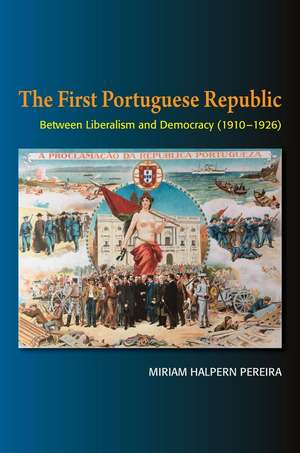The First Portuguese Republic – Between Liberalism and Democracy (1910–1926)
Autor Miriam Pereiraen Limba Engleză Hardback – 19 feb 2019
The first Portuguese Republic stood between 1910 and 1926. Freedom of press and of association became constitutional rights and incentivized a powerful and very diversified associative movement in which trade unions and friendly societies stood out in the political spectrum as they promoted popular education and culture. The time-span studied is characterized by Portugal's colonial expansion in Africa. Education emerged a different relationship between State and Church, new avenues for the development of economic activity, an increased focus on better labor conditions, and emigration to Brazil. Miriam Halpern Pereira provides a clear overview of the Republic's many achievements and the internal political and wider international limitations resulting in its downfall.
Preț: 825.16 lei
Preț vechi: 1130.36 lei
-27% Nou
Puncte Express: 1238
Preț estimativ în valută:
157.92€ • 163.13$ • 131.42£
157.92€ • 163.13$ • 131.42£
Carte disponibilă
Livrare economică 05-19 martie
Preluare comenzi: 021 569.72.76
Specificații
ISBN-13: 9781845199296
ISBN-10: 1845199294
Pagini: 224
Dimensiuni: 166 x 233 x 17 mm
Greutate: 0.43 kg
Editura: Liverpool University Press
ISBN-10: 1845199294
Pagini: 224
Dimensiuni: 166 x 233 x 17 mm
Greutate: 0.43 kg
Editura: Liverpool University Press
Cuprins
Contents Acknowledgments Series Editors' Preface Introduction 1. A Step of No Return: The Fall of the Constitutional Monarchy 2. The Republic: The Political Narrative Revisited 2.1. The "Strong Republic" and the Presidents Tefilo Braga, Manuel de Arriaga and Bernardino Machado 2.2. The "New Republic" of Sidnio Pais 2.3. The "New Old Republic" and the Presidents Canto e Castro, Antnio Jos de Almeida, Teixeira Gomes and Bernardino Machado Chapter 1 Secularization and Citizenship: The Cultural and Political Project 1. Secularization and Anticlericalism 2. State and Religion 2.1. The Scope of Secularization 2.2. The Law of Separation of the State from the Churches 3. Educating for Citizenship 3.1. From Primary School to University Education 3.2. The Spread of Public Reading Chapter 2 State and Citizenship 1. Delayed Democracy 2. The New Political Elite 3. The Citizen and the Defence and Security Forces 3.1. The Armed Forces 3.2. The Public Security Forces 4. The State and Labour Relations 5. Feminism and Citizenship Chapter 3 The Public and Civic Sphere 1. The Media and Public Opinion: The Press, Images and the Radio 2. On the Margins of Power 2.1. In Search of the "Social Republic" 2.2. In Search of Order and Authority with the Catholic Church 3. Associativism 3.1. The Employers' Associations 3.2. From Workers' Associations to Trade Unions 3.3. Popular Protest 3.4. Other Forms of Sociability: Mutualism 4. From Mutual Aid to Compulsory Social Insurance: the New Frontiers between the Public and the Private Spheres Chapter 4 From the Economy to Finance 1. Tradition, Innovation and the Diversification of Markets 1.1. The Agricultural World 1.2. Factories and Workshops 1.3. International Economic Relations 2. Under the Aegis of the Escudo Chapter 5. Empire and Emigration 1. The Republic and Colonialism 2. Emigration Policy Conclusion General Bibliography Thematic Bibliography Index
Notă biografică
Miriam Pereira is emeritus professor of Contemporary History at ISCTE/University Institute of Lisbon). She is the founder of the scientific journal Ler Historia. In 2016, the Ministry of Science and University Education awarded the Medal of Scientific Merit. Her many publications are detailed on the press website.
